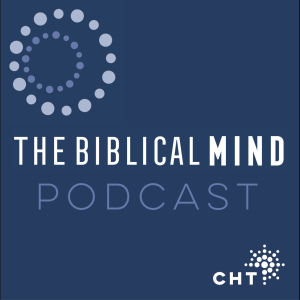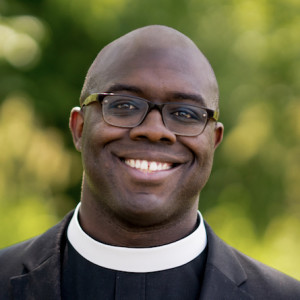The Biblical Mind
The Biblical Mind is dedicated to helping its audience understand how the biblical authors thought, promoting Bible fluency through curious, careful reading of Scripture. It is hosted by Dr. Dru Johnson and published by the Center for Hebraic Thought, a hub for research and resources on the intellectual world of the Bible.
The Biblical Mind is dedicated to helping its audience understand how the biblical authors thought, promoting Bible fluency through curious, careful reading of Scripture. It is hosted by Dr. Dru Johnson and published by the Center for Hebraic Thought, a hub for research and resources on the intellectual world of the Bible.
Episodes

Friday Jan 07, 2022
No One Asks for Forgiveness in the Bible? (Joshua Berman)
Friday Jan 07, 2022
Friday Jan 07, 2022
People don't ask for or grant forgiveness in the Bible—at least, not in the way modern people are familiar with. Scripture is less focused on whether someone feels sorry or magnanimous than on practical reconciliation and restoration. Repeatedly in biblical narratives, characters demonstrate this reconciliation with a kiss.
Rabbi Dr. Joshua Berman discusses how forgiveness as we understand it is a modern notion and how the relevant biblical notion differs.
Show Notes:
0:26 The Hebrew Bible doesn't portray apology-and-forgiveness
4:38 Defining relationships
5:52 Forgiveness in Hebrew
7:48 The modern notion of forgiveness
10:35 Kissing
15:34 Torah and incarceration
19:40 We need to "get along"
21:05 The biblical authors on forgiveness
23:55 Reconciliation should be embraced
28:13 What does God think of us?
29:25 Postscript: The Prodigal Son
Show notes by Dominique LaCroix
Credits for the music TBM podcast: hebraicthought.org/credits.

Friday Dec 17, 2021
Friday Dec 17, 2021
Discussing her book African American Readings of Paul: Reception, Resistance, and Transformation, Dr. Lisa Bowens identifies how people twisted the Scriptures written by the Apostle Paul to promote slavery and justify it as a Christian practice. But at the same time, Dr. Bowens explains, Black Americans were interpreting Paul's writings for themselves, and throughout history, they still appealed to Pauline texts extensively to protest and resist their oppression, and ultimately to build a strong foundation for the American church.
Show notes:
0:26 Hidden voices in Black Christian thought
4:25 What does sScripture actually say?
6:15 Nancy Ambrose and how Paul was preached to the enslaved
10:18 1774 Slave Petition
16:37 The slavery project and the broadening of the canon
19:40 John Jea and the miracle of literacy
25:40 Why we need to hear different voices
29:50 Salvation is spiritual and physical
34:37 For economic gain
Show notes by Dominique LaCroix
Credits for the music TBM podcast: hebraicthought.org/credits.

Friday Dec 10, 2021
What Are Sermons for, and How Can They Be Improved? (Jonathan Pennington)
Friday Dec 10, 2021
Friday Dec 10, 2021
When it comes to preaching, less is more. If you really understand a complex issue, you should be able to write it down on a postcard. In light of this, how does one avoid dumbing down their preaching while still clearly communicating a complex message?
Dru and CHT fellow Dr. Jonathan Pennington discuss his book Small Preaching: 25 Little Things You Can Do Now to Make You a Better Preacher, how to convey rich meaning in a sermon while keeping it simple, and the significance of preaching within a worship service.
Show notes:
0:26 Sermon prep
1:27 How can a preacher avoid common pitfalls?
3:22 Two schools: lofty and simple
7:55 Confidence
9:00 The ideal preacher's life/snack writing
12:48 Should you write your sermon?
17:16 The significance of preaching in the worship service
23:49 Teaching vs. preaching
31:06 "Celebrification" of preaching
33:23 Is preaching performance art?
Show notes by Dominique LaCroix
Credits for the music TBM podcast: hebraicthought.org/credits.

Friday Dec 03, 2021
Three Grinches in a Pod: Complicating Christmas
Friday Dec 03, 2021
Friday Dec 03, 2021
It's that time of year again.
It's the time when those who hate eggnog, pretty lights, cheery music, presents, and joy itself crawl out of their dark, barren hovels, bent on ruining Christmas.
Well, we aren't those people. Let us have our winter festival, says Dru. Let us have our (modest) presents, says Celina. Let us have our feasting, says Amy.
But we all ask, what does the winter festival of American Christmas really have to do with the first and second comings of Jesus Christ? Are traditional Advent practices a straightforward way to redeem the holiday? Do we even want to put the "Christ" back in "Christmas"?
Join Dru, Celina, and Amy as they discuss how we might faithfully improvise rituals of waiting and celebration to help us remember our place within the story of God's promise to the nations through Israel.
0:30 Rushing and conflating—why we're grumpy
6:08 Calling Dru out*
6:49 The fat man in the room: Christmas is not a biblical holy day
9:37 Redeeming Christmas through better rituals?
11:23 An Hebraic spin on Advent
17:22 Distraction from the establishment of God's peace through Israel
19:51 The biblical argument against telling children there's a Santa Claus
21:41 Theologically rich Advent practices
*Despite her protestations, Celina has since admitted that Mariah Carey's "All I Want for Christmas Is You" totally slaps.
Show notes by Celina Durgin
Credits for the music TBM podcast: hebraicthought.org/credits.

Friday Nov 19, 2021
Toward an Integrated Liturgy of Work and Worship (Matthew Kaemingk)
Friday Nov 19, 2021
Friday Nov 19, 2021
There is a deep division between work and worship in the West. However, the worship of the ancient Israelites integrated the sanctuary into the streets. What are ways that our work today (even sending emails) can be celebrated and offered to God as a form of worship?
With reference to his book Work and Worship, Matthew Kaemingk explains how the tasks we do every single day can be integrated into our worship and daily liturgy.
Show notes:
0:26 Wandering minds during worship
2:02 Integrated life
2:58 Spiritual divide
4:34 Work and worship
6:13 How do we celebrate our work?
12:00 Corey Wilson
12:40 Imago Dei—workers
17:40 Grander work
20:02 Physical participation in the work of God
22:57 Rituals and liturgies
27:37 Gathering rituals, and honesty with God
30:21 When wealth intercedes for work
Show notes by Dominique LaCroix
Credits for the music TBM podcast: hebraicthought.org/credits.

Friday Nov 12, 2021
Crying for Justice: Why We Should Pray the ‘Angry‘ Psalms (Trevor Laurence)
Friday Nov 12, 2021
Friday Nov 12, 2021
Pleas for justice in the book of Psalms—the imprecatory psalms—can make some Christians uncomfortable. They're often passed over in the psalter during worship. How do petitions for justice map onto the mission of Jesus? How are imprecatory prayers compatible with commands to love our neighbors?
Though the Psalms contain many cries for vengeance, they also continually call readers back to a standard of holiness. Trevor Laurence discusses imprecatory prayers, the power of words to express profound pain to God, and how we can instinctively discern God and the world as we struggle through life.
Show notes:
0:26 How should Christians reconcile imprecatory prayers?
4:00 Logic in the request for vengeance and vindication
6:40 Callback to the covenant justice of God
8:36 Rhetorical violence
9:10 Deadly false accusations and the power of words
12:30 What we're missing in our worship
15:36 Profound pedagogies of prayer
17:11 Imagination and embodied experience
20:35 Ritual epistemology
21:34 If Trevor could design a church service
25:32 Policy and advocacy in the church
28:22 Liturgy: patterns that govern your life
Show notes by Dominique LaCroix
Credits for the music TBM podcast: hebraicthought.org/credits.

Friday Nov 05, 2021
Friday Nov 05, 2021
"Blackness is a part of American culture." Too often American Christianity is equated with white Christianity, while expressions of Black Christianity are overlooked. Continuing our series "By the Oppressed, to the Oppressed: How the Marginalized Church Reads Scripture," Esau McCaulley, author of Reading While Black, explains how American Black history has given Black Christians an important lens through which to understand Scripture, and how power can actually be a distorting lens. When people hear biblical interpretations they might have missed because of their own experiences, the narrative can change.
Show notes:
0:27 When we misunderstand what we see and hear
3:08 Black Bible reading
6:33 Expressions of Black Christianity
11:36 Distorting the influence of power
16:03 The "Slave Bible"
23:48 Suffering and biblical interpretation
27:14 The use of the Bible in the Civil War
28:24 We need a fuller range of interpretations
34:33 Reevaluating your theological perspective
Show notes by Dominique LaCroix
Credits for the music TBM podcast: hebraicthought.org/credits.

Wednesday Nov 03, 2021
Understanding Supersessionism and the Controversy over a TBM Article (Ari Lamm)
Wednesday Nov 03, 2021
Wednesday Nov 03, 2021
A couple of weeks ago, The Biblical Mind published an article by Michael LeFebvre titled Jesus Restored the Original Purpose of the Law in the New Testament. Some readers expressed concern that the article endorsed supersessionist views. Not intending to suggest supersessionism, Michael revised some language in the article to address the concerns. It was retitled Jesus' Concept of the Law in the New Testament. Some Christians readers said they didn't fully understand the reaction.
In response, Rabbi Dr. Ari Lamm joined the podcast to explain supersessionism, the relationship between Christianity and Judaism, and the reaction to some language in Michael's original article.
Show notes:
0:26 What the original title possibly conveyed
4:30 The relationship between Judaism and Christianity
8:01 Integration of "new" and "old"
9:40 Marcion's argument
14:34 Supersessionism
18:58 Intention with words
23:00 Response to comments
30:50 Ari's stance on the article
48:20 Why is "legalism" a bad word?
55:06 The Pharisees are too lenient
Show notes by Dominique LaCroix
Credits for the music TBM podcast: hebraicthought.org/credits.

Friday Oct 29, 2021
Prosperity, Responsibility, and Economics in the Torah (Michael Eisenberg)
Friday Oct 29, 2021
Friday Oct 29, 2021
Does the Torah mention wealth redistribution? What is the purpose of leaving the corners of your field unharvested? What economic system does the Torah advocate, and how would one live in accordance with it? Join us this week as Michael Eisenberg discusses these questions and more, covered his latest book, The Tree of Life and Prosperity.
Show notes:
0:26 Is the Torah capitalist or socialist? Or . . . ?
4:00 Abraham and empowerment
5:40 Genesis: prescriptive vs. descriptive
8:33 Is "wealth" a bad word?
10:37 Modern example: CEO of Salesforce
11:39 Charity (tzedakah)
14:11 Difference between Adam Smith and Torah
17:49 Fruitfulness
22:40 "Justice with no incarceration"
Show notes by Dominique LaCroix
Credits for the music TBM podcast: hebraicthought.org/credits.

Friday Oct 22, 2021
How the Marginalized Church Reads the Bible, Part 1: Vince Bantu
Friday Oct 22, 2021
Friday Oct 22, 2021
New CHT fellow Dr. Vince Bantu of Fuller Theological Seminary is back on the podcast, this time to discuss the how historically marginalized and oppressed parts of the church understand Scripture better than the dominant church does—from the early church to the African church to the Black church in the U.S. today. Dr. Bantu and Dru explore the interpretive advantages that the lack of political and social power can confer on readers of the Bible—a book written largely by people who suffered oppression and exile.
Show notes:
0:00 The dominant church vs. the marginalized church
6:10 Imperial Christendom and the temptation of political power
13:08 Dualisms of the white church that the Black church doesn't have
20:03 The Black church's grasp on biblical righteousness and justice
29:27 God's providence and the West African slave trade
36:35 The white church's incomplete gospel
Show notes by Celina Durgin
Credits for the music used in TBM podcast.






